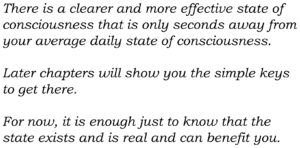Created May 12, 2023
Welcome to this week’s Bill Harvey Blog.
To read Powerful Mind Pt. 9, click here.
Key One: Outsmart Hasty Closure
How to override the mechanism of
“making up one’s mind too fast due to overload panic”
The way Powerful Mind works is not so much that it requires you to do things; it changes the way you apprehend things. It exposes your conditioning so you can overrule it. You begin to have more insights, without the automatic brain function of pigeonholing and ignoring familiar experiences. To get back to your natural mind under the layers of conditioning, you have to be willing to re-examine everything. It’s a new way of seeing, with the truly naked eye, stripped of habits and assumptions. It’s a re-start of life.
By looking at everything a little more closely, you will still come back to the same deep intuitive positive feelings you have always had, but you will uproot and discard the lingering negative feelings by understanding them all the way through. Changing something in your daily pattern just ever so slightly, you will have removed a pebble in your shoe. That particular cause of negativity will start to shrink and eventually disappear.
This chapter is all about how to do that. It comes down from the sweeping objectives and high level principles set forth in the first four chapters, to rules of action applicable in each micro moment. As your mind offers up its plethora of thoughts and feelings, you need to discern the really valuable ones in the present moment, filtering out the rest for later contemplation. If an idea or a feeling is important it will come back — you needn’t be overly concerned about forgetting things that are truly important. But keep writing down trigger words whenever you have the feeling that a specific thought is worth coming back to.
Now let’s talk about hasty closure.
Built into each human being before birth is an information-processing program whose apparent purpose is to help us understand our external and internal experiences.
It works as follows: certain experiences or perceptions trigger a feeling of dissonance in the mind; you pay closer attention to and think about these
until you have a feeling of having absorbed their information, at which point
the feeling of dissonance goes away and we say that you have achieved closure.
Hasty closure can be defined as those instances in which it would have been useful to you to think further before closure.
Why would Nature build such a program into our brains? Do other animals also have such a program?
Nature does such things to increase our survivability. Sometimes Nature experiments, as Darwin pointed out, building in programs and/or characteristics that may have been intended to increase survivability, but actually do not, and which may even lower the species’ chances of survival. In those cases, the species dies out.
We can see some evidence of this program in other animals besides ourselves, as for example when you play with a cat or dog and trick it in some way — it looks like the animal is trying to figure out what happened. Of course, we may just be anthropomorphizing (projecting human ways onto non-humans) and what looks like the animal’s search for closure might be something else.
The brain’s drive for closure is something that has been proven scientifically by the field of gestalt psychology. That branch of psychology has experimentally demonstrated over and over again that the brain fills in gaps in pictures based on expectations derived from prior experiences and even based on belief systems imposed by conditioning.
We can all validate this for ourselves based on our own experiences. When you look at clouds, don’t you often see objects in their shapes? This is a form of perceptual gestalting — the brain trying to make sense of something, putting things seen into categories. An automatic function of the brain is “guessing” at what is out there. If we are moving rapidly we may see a sign and think we know what it says, but then if we look more carefully, it actually says something different. Yet the brain threw up a “guess” at what the sign said, rather than just leaving it a blur. These are “autonomic” (automatic pilot) attempts at perceptual closure. There are also autonomic attempts at intellectual closure.
I often — pretty much every day, many times each day — find myself feeling an urgency to understand something, to explain it to myself, so that I experience the feeling of closure, which comes as a sense of sudden release and the willingness to go on to something else.
You’ve undoubtedly experienced the same thing, perhaps not as often or maybe more often — we are all different, with an underlying commonality. Trying to remember the word for something is one simple example. Isn’t it a bit strange how important it seems to get to the end of the process, where you finally remember the word? This is universally obvious evidence that we are programmed to want to achieve closure.
Details to follow in the subsequent posts.
Love to all,
Bill

